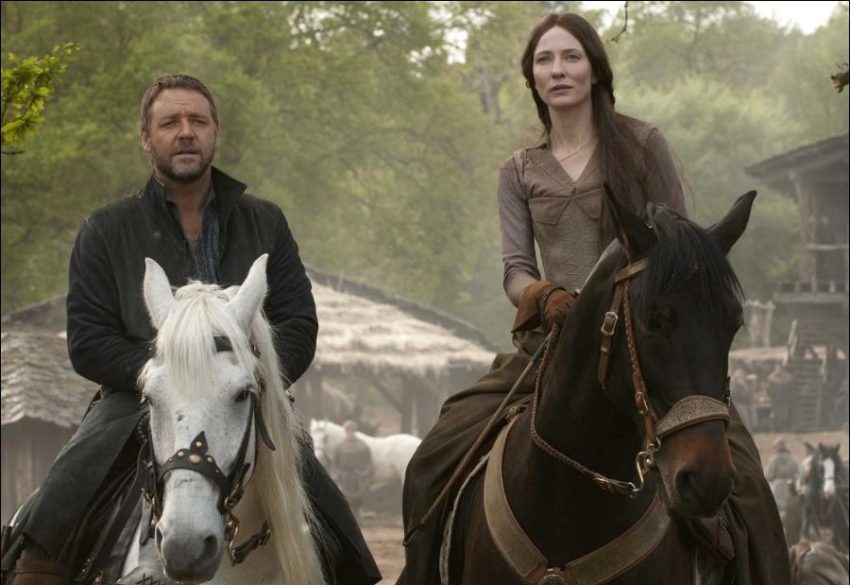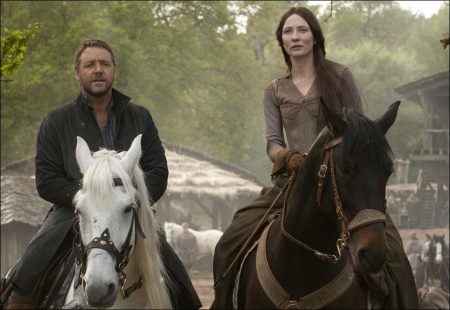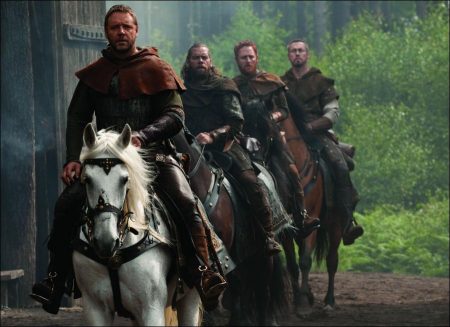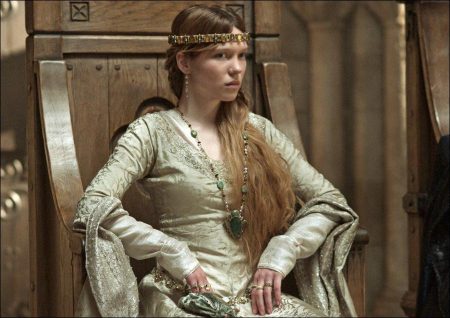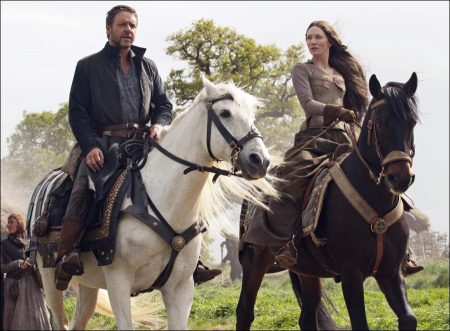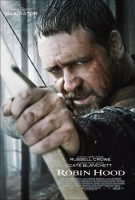Taglines: The untold story behind the legend.
Oscar winner Russell Crowe stars as the legendary figure known by generations as “Robin Hood,” whose exploits have endured in popular mythology and ignited the imagination of those who share his spirit of adventure and righteousness. In 13th century England, Robin and his band of marauders confront corruption in a local village and lead an uprising against the crown that will forever alter the balance of world power. And whether thief or hero, one man from humble beginnings will become an eternal symbol of freedom for his people.
The untitled Robin Hood adventure chronicles the life of an expert archer, previously interested only in self-preservation, from his service in King Richard’s army against the French. Upon Richard’s death, Robin travels to Nottingham, a town suffering from the corruption of a despotic sheriff and crippling taxation, where he falls for the spirited widow Lady Marion (Oscar winner Cate Blanchett), a woman skeptical of the identity and motivations of this crusader from the forest.
Hoping to earn the hand of Maid Marion and salvage the village, Robin assembles a gang whose lethal mercenary skills are matched only by its appetite for life. Together, they begin preying on the indulgent upper class to correct injustices under the sheriff.
Robin Hood (Russell Crowe) chronicles the life of an expert archer, previously interested only in self-preservation, from his service in King Richard I’s army against the French. Upon Richard’s death, Robin travels to Nottingham, a town suffering from the corruption of a despotic sheriff and crippling taxation, where he falls for the spirited widow Lady Marion (Cate Blanchett), a woman skeptical of the identity and motivations of this crusader from the forest. Hoping to earn the hand of Maid Marion and salvage the village, Robin assembles a gang whose lethal mercenary skills are matched only by its appetite for life.
With their country weakened from decades of war, embattled from the ineffective rule of the new king and vulnerable to insurgencies from within and threats from afar, Robin and his men heed a call to ever greater adventure. This unlikeliest of heroes and his allies set off to protect their country from slipping into bloody civil war and return glory to England once more.
About the Production
The daring tales of Robin Hood have been a part of English literature for decades. As put succinctly by scholar J.C. Holt: “There are a quiverful of possible Robin Hoods. Even the likeliest is just a shot in the gloaming.” Yet this archetypal story has survived and been passed down through generations, morphing as each era adds to the evolving canon. “What began as an oral legend,” reflects Holt, “ended up as a script.”
The stories of Robin are among the oldest in England’s oral histories, stretching far back into the medieval period of the 9th century with tales of “Robin the Be-header” and finding literary form with surviving 15th- and 16th-century ballads such as A Gest of Robyn Hode, Robin Hood and the Curtal Friar and Robin and the Monk. As far as we know, however, there’s no one actual Robin to whom we can look as the single authentic figure. From suggestions that the surname Robehod was often applied to a man after he became an outlaw, to the conjecture that “Robin Hood” was a stock pseudonym used by thieves, theories abound and the legend endures.
The hero has also found a rich legacy on screen. Robin has been featured in upwards of 30 notable film and television productions, ranging from a 1913 Ivanhoe adaptation, through the films of Douglas Fairbanks (Robin Hood, 1922), Errol Flynn (The Adventures of Robin Hood, 1938), Sean Connery and Audrey Hepburn (Robin and Marian, 1976) and Kevin Costner (Robin Hood: Prince of Thieves, 1991), as well as popular television serials such as the BBC’s Patrick Troughton series Robin Hood (1953), Robin of Sherwood (1984) and the more recent Robin Hood (2006).
For all his popularity, however, Robin’s on-screen tale rarely evolves, with filmmakers invariably peddling familiar tales such as those of the evil Sheriff of Nottingham, the malicious Guy of Gisburne and the iconic damsel in distress, Maid Marion. Inevitably, Robin has been portrayed as either a dispossessed nobleman or, more likely, a gallant rogue with arms akimbo who serves comeuppance to the rich and gives blissfully to the poor.
During the filming of American Gangster with Sir Ridley Scott, producer Brian Grazer approached Russell Crowe about starring in a new Robin Hood. Grazer looked forward to reteaming with the performer, with whom he had already enjoyed two successful collaborations-on A Beautiful Mind, for which Crowe earned an Oscar® nod, and Cinderella Man. For this telling, the men were interested on a unique take on the age-old legend: an origin story that explains how a common archer in King Richard’s army transformed into the legend we know as Robin Hood. Set against the backdrop of the Crusades, this action-adventure would give historical framework to the later exploits that had been covered in many other versions of the tale.
Grazer came aboard to develop and produce the project through Universal Pictures and the company he shares with Academy Award winner Ron Howard, Imagine Entertainment. “Movies about heroes inspire me,” states the producer. “The story of Robin Hood particularly appealed to me because it is about a man who has nothing but the right cause in his mind, and the skill and resoluteness to pursue it.”
“With our film, we explain who the Sheriff of Nottingham, Maid Marion and her father-in-law are, the dynamics of the northern part of England and the barons, and how England was controlled at the time,” Grazer continues. “By the end of the movie, you also know who Robin is. The end of our movie is the beginning of all the dozens or so other films that have been made.”
Grazer found the Australian actor keenly interested in reworking the legend. He admitted an interest in the outlaw that stretched back several decades. “I was very enthusiastic,” Crowe says. “Robin Hood has always been in the back of my mind since I was a child. I was a big fan of the various incarnations I saw when I was growing up. There’s a universal connection that everyone makes to Robin Hood, which is at the core of the story: there might be somebody out there who cares enough to redress the imbalance. There’s an empowerment quality about Robin to which people respond.”
Crowe’s agreement, however, came with a caveat. “I said I’d do Robin Hood, but only if it were a fresh take,” he adds. “It is one of the longest-surviving stories in the English language. That requires due respect. I took the attitude that if you’re going to revitalize Robin Hood, it has to be done on the basis that whatever you thought you knew about the legend was an understandable mistake. It has to be different from what has come before. Take Robin and Little John, for example, who don’t get on when they first meet. When we first meet them, they have a disagreement. But that doesn’t take place on a log over a creek with a staff fight, which has been done to death. What we’ve done is to redefine the times and shift the timeline.”
Crowe and Grazer turned their attention to their only choice to helm the film: Ridley Scott. “It needed a director who could handle tremendous scope,” notes Grazer, “someone who embraces authenticity, who is interested in the milieu, the time and the political and historical events that were occurring. Ridley is captivated by all those things. If we were going to make this film, it had to be the Gladiator version of Robin Hood. I wanted to understand how brutal that time was and have it visually expressed in the most exciting and thrilling kind of action-adventure. Only Ridley can do that.”
Scott and Crowe have a partnership that dates back to their wildly successful multiple Oscar winner, Gladiator, the film that reset audiences’ expectations of the historical epic. To date, their collaboration has also resulted in A Good Year, American Gangster and Body of Lies. When Crowe and Grazer pitched the idea to the director, he responded enthusiastically.
Scott is a longtime student of history, and his last period thriller, Kingdom of Heaven, had focused on the fall of Jerusalem 12 years before King Richard I met his untimely death. “I love period films,” offers Scott. “I started with The Duellists, and then I’ve done the Roman epic and now I’ve gone back to medieval times again.”
With Scott on board, Robin Hood gathered momentum. The filmmakers shared a common vision: they chose to explore how a humble man could become a champion of the people, and they sought to answer that question by telling his story within a specific historical context. Elaborates Grazer: “We wanted to embrace the political and historical facts of the era: England was bankrupt, threatened both by civil war and by France, and in the hands of an inept king in John. Against that backdrop, we could explore an origin story of how Robin Hood came to be.”
To fulfill Scott, Grazer and Crowe’s vision, the men turned to screenwriter Brian Helgeland, who had been awarded an Oscar® for his previous collaboration with Crowe, L.A. Confidential. After he received a call from Scott to craft the script, Helgeland knew that what would interest him most was the chance to “humanize the legend.”
Robin Hood (2010)
Directed by: Ridley Scott
Starring: Russell Crowe, Cate Blanchett, William Hurt, Matthew Macfadyen, Mark Strong, Oscar Isaac, Lea Seydoux, Eve Hewson, Josh Herdman, Charlie Vincent, Nasser Memarzia, Antonio Lujak
Screenplay by: Brian Helgeland, Paul Webb, Tom Stoppard
Production Design by: Arthur Max
Cinematography by: John Mathieson
Film Editing by: Pietro Scalia
Costume Design by: Janty Yates
Set Decoration by: Sonja Klaus
Art Direction by: Marc Homes: Anja Müller, Katja Soltes, Tom Still, Steve Summersgill, Nóra Takács, Ketan Waikar
Music by: Marc Streitenfeld
MPAA Rating: PG-13 for violence including intense sequences of warfare, and sexual content.
Distributed by: Universal Pictures
Release Date: May 14, 2010
